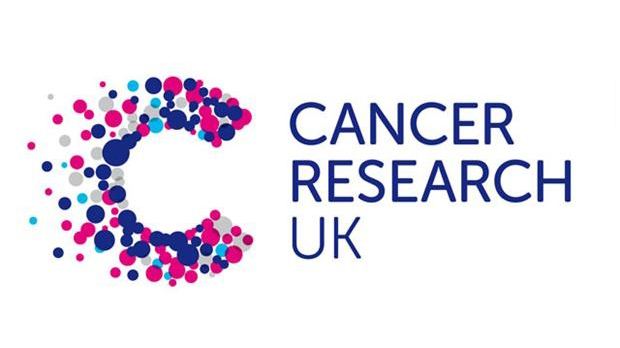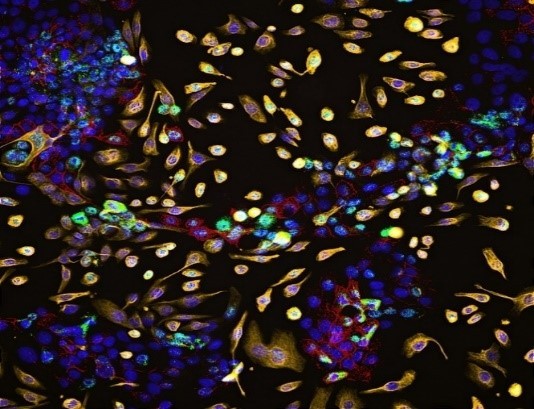Cancer Models
 Queen Mary University of London (QMUL) is a world-leader in cancer research, and is home to Barts Cancer Institute – an official CRUK centre. The Blizard Institute also houses key cancer research themes including in skin cancer, brain cancer, childhood cancer, colorectal cancer, and oral cancer, with further cancer research taking place across the university.
Queen Mary University of London (QMUL) is a world-leader in cancer research, and is home to Barts Cancer Institute – an official CRUK centre. The Blizard Institute also houses key cancer research themes including in skin cancer, brain cancer, childhood cancer, colorectal cancer, and oral cancer, with further cancer research taking place across the university.
A major strength of cancer research at QMUL is our focus on in vitro cancer models. This has important advantages in enabling more accurate prediction for clinical prognosis, and development of new therapies. Major initiatives have included the CANBUILD project, development of microfluidic cancer models, and cancer metastasis models. All of these initiatives involve cross-faculty collaboration, and this multi-disciplinary approach is a great strength – cancer research at QMUL involves biologists, computer scientists, bioengineers, and mathematicians. Investment in cross-faculty facilities including the CREATE lab has been an important factor in the success of this approach.
The growth of the Animal Replacement Centre (ARC), within the Blizard Institute, has been an exciting recent development. This is a centre of excellence for the development of accurate human cancer models that can reduce the number of animals used in cancer research. Funded by Animal Free Research UK, and directed by Prof Mike Philpott and Dr Adrian Biddle, the ARC is improving the ability to predict the behaviour of human cancer using in vitro human models. Since launching, the ARC has attracted further funding from the National Centre for the 3Rs (NC3Rs) to develop a metastasis on a chip model, and Oracle Head & Neck Cancer UK to pursue the use of in vitro models for development of a clinically predictive disease signature for oral cancer.

People
- Dr Adrian Biddle
Theme Lead for Cancer Models
DHT Lecturer in Animal Replacement Science, Queen Mary University of London - Dr Vahitha Abdul Salam
Lecturer, Queen Mary University of London - Prof Fran Balkwill
Deputy Lead, Centre for Tumour Microenvironment, Queen Mary University of London - Prof Cleo Bishop
Professor of Senescence, Queen Mary University of London - Dr Ana Caetano
Clinical Senior Lecturer, Queen Mary University of London - Dr Christopher Chapman
Lecturer in Bioengineering, Queen Mary University of London - Prof Paul Chapple
Professor of Molecular Cell Biology, Queen Mary University of London - Dr Elena De Vita
Lecturer in Synthetic Biology and Biotechnology, Queen Mary University of London - Dr Marc Fernandez-Yague
Lecturer in Chemistry, Queen Mary University of London - Dr Paolo Gallipoli
Clinical Senior Lecturer, Queen Mary University of London - Prof Julien Gautrot
Professor of Biomaterials and Biointerfaces, Queen Mary University of London - Prof Richard Grose
Professor of Cancer Cell Biology, Queen Mary University of London - Prof Leonardo Guasti
Professor of Experimental Endocrinology, Queen Mary University of London - Dr Muhammad Salman Haleem
Lecturer in Computer Science, Queen Mary University of London - Prof Kairbaan Hodivala-Dilke
Professor, Queen Mary University of London - Prof Martin Knight
Professor of Mechanobiology, Dean for Research, Queen Mary University of London - Prof David Lee
Professor of Cell & Tissue Engineering, Queen Mary University of London - Dr Ryan O'Shaughnessy
Reader in Cell Biology, Queen Mary University of London - Dr Luigi Ombrato
Group Leader / Lecturer, Queen Mary University of London - Prof Venet Osmani
Professor of Clinical AI and Machine Learning, Queen Mary University of London - Dr Oliver Pearce
Reader in Tumour Extracellular Matrix, Queen Mary University of London - Dr Ines Sequeira
Senior Lecturer / Group Leader, Queen Mary University of London - Prof Greg Slabaugh
Director of the Digital Environment Research Institute, Queen Mary University of London - Prof Yi Sui
Professor of Fluid Mechanics, Queen Mary University of London - Dr Muy-Teck Teh
Senior Lecturer, Queen Mary University of London - Prof Zion Tse
Academy of Medical Sciences Professor in Bioengineering, Queen Mary University of London - Dr Stefaan Verbruggen
Lecturer in Medical Technology, Queen Mary University of London


